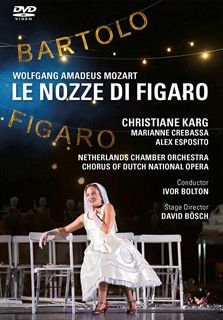MOZART Le Nozze di Figaro (Bolton)
View record and artist detailsRecord and Artist Details
Genre:
Opera
Label: Arthaus Musik
Magazine Review Date: 11/2020
Media Format: Digital Versatile Disc
Media Runtime: 180
Mastering:
DDD
Catalogue Number: 109 393

Tracks:
| Composition | Artist Credit |
|---|---|
| (Le) nozze di Figaro, '(The) Marriage of Figaro' |
Wolfgang Amadeus Mozart, Composer
Alex Esposito, Figaro, Bass-baritone Christiane Karg, Susanna, Soprano Dutch National Opera Chorus Eleonora Buratto, Countess Almaviva, Soprano Ivor Bolton, Conductor Jeroen de Vaal, Don Curzio, Tenor Katharine Goeldner, Marcellina, Mezzo soprano Krystian Adam, Basilio, Tenor Louise Kemény, Barbarina, Soprano Marianne Crebassa, Cherubino, Mezzo soprano Matteo Peirone, Antonio, Bass Netherlands Chamber Orchestra Stéphane Degout, Count Almaviva, Baritone Umberto Chiummo, Bartolo, Bass |
Author: Richard Wigmore
Updating Figaro is always likely to minimise the class tensions that underlie this most humane and (potentially) poignant of musical comedies. In David Bösch’s Dutch National Opera production, the opera is a sexual battleground set in a crazily dysfunctional household, with an ever-present threat of violence. During the opening sequence Patrick Bannwart’s revolving set successively reveals the Countess collapsing in an alcoholic stupor, the Count in vest and tracksuit bottoms working out on his exercise bike, and Cherubino flouncing sulkily in his 21st-century teenager’s bedroom. Empty bottles and glasses are strewn everywhere, with a distraught-looking Susanna trying to clear up the mess. The whole Almaviva establishment exudes a heavy-drinking, past-caring decay. Pink-clad servants in powdered wigs disorientatingly evoke the opera’s original setting. But rococo-pretty this is not.
There are some good visual gags, as when Cherubino scampers around the room hidden inside a cardboard box, or when Susanna coolly presses her remote to open the wardrobe. The theatrical pacing is sharp, the characters’ interaction lively and detailed. This, though, is a Figaro as likely to make you squirm as smile. Violence first flares up when Susanna and Marcellina attempt serious damage with a hot iron. Figaro, resorting to his former trade, sadistically shaves Cherubino’s head as he sings ‘Non più andrai’, then joins with the Count in roughing the boy up. Several times the Count threateningly brandishes a rifle or an axe. At the end of Act 2 the Countess seizes the axe and lunges at the Count. Predictably, Mozart and da Ponte’s final vision of harmony and reconciliation, set here amid a half-wrecked wedding reception, is anything but.
Urged on by Ivor Bolton’s brisk, no-nonsense direction, the singers throw themselves wholeheartedly into Bösch’s conception. All are camera-friendly and act with their faces as well as their voices. A beacon of sanity amid the mayhem, Christiane Karg’s Susanna is both razor-sharp (as any Susanna must be) and long-suffering, frustrated with Figaro, repelled – even if she can conceal it – by the loutish Count. It’s typical of the production that her tender ‘Deh vieni non tardar’ is undermined by Figaro’s threats of strangulation – comic dislocation or a betrayal of a moment of exquisite stillness, according to taste. Alex Esposito’s handsomely sung Figaro is highly strung, always two steps behind his fiancée: a would-be cool dude who pours out his disillusionment in a bitterly incisive ‘Aprite un po’ quegl’occhi’.
Once over that initial encounter with the bottle, Eleonora Buratto makes a more or less sympathetic Countess, essentially lonely, caught up in a destructive love-loathe relationship with her husband. Generous of voice and phrasing, she excels in the Countess’s two solos, softening her bright, vibrant tone in the reprise of ‘Dove sono’, and gracefully ornamenting the melodic line. Stéphane Degout’s charismatically sung Count, at once seedy, dangerous and absurd, dominates the stage whenever he appears. His ‘vengeance’ aria, during which he contemptuously pours champagne over a cowering servant, is a vocal and histrionic tour de force.
Although her Italian can be vague, Marianne Crebassa, with her gleaming mezzo, plays the confused, gangling adolescent to the life, skulking around in a woollen cap before morphing into a bleached-blond punk. The Marcellina and the dry-toned Bartolo are vocally so-so; but like Krystian Adam’s camp, pink-suited Basilio and Louise Kemény’s beautifully sung Barbarina, they fit naturally into Bösch’s conception. As in most productions, Marcellina’s and Basilio’s Act 4 arias are omitted. Ivor Bolton finely controls the mounting tension of the big ensembles, though more than once his tempos sound too rigidly held, starving the singers of expressive space. You’ll look in vain here for moments of dreamlike radiance. But the conducting is of a piece with a production that rattles along entertainingly enough, sometimes amuses, sometimes alarms, but never moves. Which in Figaro can’t be quite right.
Discover the world's largest classical music catalogue with Presto Music.

Gramophone Digital Club
- Digital Edition
- Digital Archive
- Reviews Database
- Full website access
From £8.75 / month
Subscribe
Gramophone Full Club
- Print Edition
- Digital Edition
- Digital Archive
- Reviews Database
- Full website access
From £11.00 / month
Subscribe
If you are a library, university or other organisation that would be interested in an institutional subscription to Gramophone please click here for further information.




